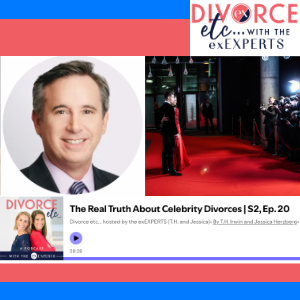
Lessons from Celebrity Divorce: Part 2

[Source: Divorce & Beyond Podcast]
Celebrity Lawyer Christopher C. Melcher, who is ranked as a best family law attorney in California, explains lessons from celebrity divorce for the non-famous in part 2 of the Divorce & Beyond Podcast.
Host:
Coming up on today’s episode of the Divorce and Beyond podcast.
Christopher Melcher:
We have a system where you put on your case according to what you say happened, and I put on my case according to what I say happened and the judge determines what the facts are, whether they’re true or not, doesn’t matter in absolute sense. It matters what the judge believed is true.
Susan Guthrie:
Hello and welcome to The Divorce and Beyond podcast. I’m Susan Guthrie, your host. As a top divorce attorney and family law mediator for 30 years, I know what you need to know to get through your divorce and most importantly, how to move beyond it to thrive and transition to your new future. My experts and I are here to give you the insider view into the process. So listen in for the wisdom and expert information you need on your journey through divorce and beyond.
Hello listeners and welcome back to part two of our special end of the year double episode. And for those of you who are celebrating today, Merry Christmas. Part of our gift to you will be part two of this episode with celebrity divorce attorney Christopher Melcher. If you did not listen to last week’s part one of this episode, I highly encourage you to do so. Chris had a lot of great takeaways from celebrity cases that have been in the news to help you have a better divorce. And then he continues with me in this episode, we actually talk about several of the cases that you’ve been reading about lately, but again, always with the idea of pulling out those kernels, those golden nuggets that are going to help you have a better divorce. So listen in and learn what you can from breaking up like the stars.
You’ve written one of the premier books on prenups, prenuptial agreements and I know that many of your clients, I would guess that a large part of what you do is creating those prenups and defending those prenups and dealing with those prenups in all their iterations. What can my average listener going through divorce learn from the celebrities or high profile divorces on the issue of prenups?
Prenup Enforceability & Issues
Christopher Melcher: Well, sure, this is… My thoughts have evolved quite a bit on this topic and I spent most of my career focusing on premarital agreements and me and my partner Peter Walzer, were just kind of known for prenups. Yeah, I did create that treatise as a two-year project and as a practice guide for other lawyers on prenups, but I’ll tell you that I’ve stopped writing them. That was my New Year’s resolution of last year. So as of this year, I will no longer write premarital agreements and one of the reasons is that I just don’t like these transactions. I understand there are economic reasons and particularly if there’s kids of a prior marriage that need to be financially protected and then there’s going to be a new spouse who needs to be financially protected. There’s certainly an inherent conflict there between kids from prior relationship and new spouse.
There is a very solid reason to have a prenup for that purpose. But in a lot of these other relationships, I find that there’s this issue of power and control. There’s kind of half-hearted going into a marriage. There’s people signing these agreements who have no idea what they’re getting into, that they love this person, but they have no sophistication, never dealt with a lawyer, never had any money, and they don’t even want to negotiate or question it because that would be sign of disloyalty and they might ruin their relationship. So they end up signing one-sided harsh, you get nothing and like it deals and then sometimes those are enforced. And so for me at this point in my career, I just don’t want to take part in it anymore. I will definitely litigate these things, so either defend if it’s a valid agreement, I’ll defend that in court or try and have it set it aside if I don’t think it’s valid.
Prenups & Legal Marriage Obligations
With that big proviso there, yes, we see many celebs have prenups, and I understand why a lot of these relationships are not for life. They’re for three years and it’s very complex when you have an artist out there doing a bunch of work and creating things during that marriage that would be community property under California law. It is much easier in a divorce just saying, “Hey, whatever I do is my separate property not subject to property division.” So I get it. I totally get it. Most people have it that have wealth. Now for the rest of us, what can we learn from this? To me, the number one takeaway is that a prenup forces the couple to think about their finances in a way that other couples just don’t. Most couples that are contemplating marriage will think about, well, when are we getting married? Where are we getting married? Who are we going to invite?
Do we want to have kids together? Do we want to stay in this area together? These type of things are discussed. They don’t discuss, “Hey, if something is earned or bought during marriage, how’s it going to be titled? If one of us dies during marriage, are we going to inherit the rest of that? If we break up, are you going to support me or am I on my own?” Those are never discussed, but in a prenup we force people to have that conversations and we find sometimes they’re on the same page. Many times they’re not. Many times they don’t understand the law, which of course they don’t. And I’ve seen a lot of times where folks will say, “Hey, I thought once we got married, everything that you had is now ours, and now I’m learning that no, that your premarital property is your separate property by law.”
They just didn’t know that. But it came out through the prenup when we’re writing it saying, “Yeah, of course, whatever we brought in the marriage is your separate property by law.” But a lot of people thought, no. And now that we uncover that, that is going to avoid potentially some resentment if they can get over that fact because during marriage, had they not been alerted to that, they would think like, “What do you mean this is your house? What do you mean that’s your bank account? What do you mean that’s your income stream? We’re married, this is ours.” No. By law, it’s not if it’s before marriage.
So education about what are the legal rights and obligations of a marriage, understanding who’s going to pay what bills during marriage and who’s going to pay something after separation or what are you going to get after death that is extraordinarily healthy. And whether there’s a prenup or not, I think every couple should be having that education and discussion with each other because otherwise they’re getting into a marriage and sure they got married at the right wedding and the right location and all that, but then they’re in this miserable relationship because one person has all the money and the other person thinks that it should be shared. So that’s what I like about prenups is it forces that conversation. Now in the economics of it, hey, that’s between the parties, but I do think that there are advantages and disadvantages that sometimes result from these agreements.
Have Financial Discussions Before Marriage
Susan Guthrie: I agree with you. I’ve done them in my career. I always have found them to be extremely uncomfortable situations. It’s not a negotiation that often feels like it’s on equal terms as you pointed out. But I agree with you as well that that type of a conversation is not only healthy, it’s essential for a couple who’s going into a marriage. Because as we know and listeners and so many people we find as they enter into divorce, they don’t realize when you enter into a marriage are actually entering into a legal contract that you both have rights and obligations that arise out of that relationship. And as you just so eloquently described, people don’t very often understand because when you go in and sign for that marriage license, no one sits you down and explains to you what you’re getting into from a legal aspect.
So I do agree that that’s a very healthy conversation to be having. And we know the world is full of spenders and savers and for some reason they marry each other all the time and then we see them on the other side. But let me ask you if you have time, I have a couple of cases that are in the news or have been in the news recently I wanted to get your take on, and one of them is a case where a prenup really caused a lot of… Really brought the case into the news, I would say. You and I both were on a bunch of different news outlets talking about Kevin Costner‘s divorce from his ex-wife, Christine, and that was a case where there was quite a bit of litigation very quickly.
They were in court quite a bit, and much of it centered around whether the prenup was going to be enforced, although that I don’t believe was ever determined because they finally settled it, but there were spousal support and child support issues and the marital residence or his residence. So that’s the complete opposite case of the ones you were talking about earlier where most of the time they happened behind closed doors. That one happened in Santa Barbara Court every day, it felt like. What can people learn from that case?
Kevin Costner’s Celebrity Divorce Details
Christopher Melcher: Sure. So I followed that case closely as a commentator for Fox News and Extra TV. And so I was in court watching the proceedings, looking at the court papers, talking to folks, and there’s a lot of lessons out of this one. So this is a long-term marriage. They’re married for 20 years. They had three teenage kids. It was a lot of money made during marriage, but there’s a prenup. And the prenup said, “Hey, whatever Kevin makes during marriage is going to be his separate property.” That there was a provision to pay her some money on signing. I call signing bonus for the prenup. It was $200,000. She got that money was tucked away, so it was now $400,000. And then it said, “Hey, if we ever break up in this length of marriage 20 years, she gets a million bucks.” So she was looking at walking away with $1.4 million, which of course is a lot of money and is a lot more than most people see, but compared to his wealth, which was well over a hundred million dollars and was probably in the hundreds of millions of dollars, it was nothing.
Kevin Costner’s Alimony & Child Support Payments
Now, she did get child support over $60,000 a month. So there’s quite a bit of child support there. She was fighting for more and probably it was appropriate that she would get more based on the wealth that he had. Why not? But what happened was this became very contentious and it did start with a statement by Kevin, which was really weird, and it wasn’t a joint statement. It was a Kevin statement kind of saying, “this is happening to me. I don’t want this to happen.” So it was very weird. It wasn’t, “Hey, we’re consciously uncoupling.” It was kind like she’s leaving and I don’t want this to happen. So it was already like, “Okay, this is going to be a fight. We already know this going to be a fight.” Sure, they tried to settle quietly and quickly, but she had unrealistic expectations. And this is one of the takeaways for us is that you got to know what your case is worth. And if you oversell it, you’re not going to get the money.
Yes, there was a need for Kevin or desire, I’m sure for Kevin to handle this in a quiet, dignified way, and maybe he would’ve paid a little bit extra to get that done quickly, but she didn’t want just a little bit extra. She wanted a lot extra, and because she wanted so much, it forced it to court and because it went to court then all of this information… There was nothing about his conduct, but a lot of his financial information that was very private… Now all of a sudden we’re hearing what’s happening on these projects, and how much money he’s making, and what his houses look like. I mean, it was all laid out there in a public courtroom. The thing is that whatever power that Christine had over him about wanting to keep things quiet was now gone because it’s all out there anymore. So that’s another thing is that if somebody has something over the other partner. Just like any good blackmail, once you reveal it, you have no power.
Susan Guthrie:
Once you drop your threat, once that’s out there, you’ve got no more threat, but it’s very true, and this was definitely that case.
…Stay tuned for more from Celebrity Divorce attorney Christopher Melcher who’s here with this special two-part episode, helping you break up like the stars. He’s sharing lessons from celebrity splits for the non-famous.
Christopher Melcher:
We’re surrendering control. That’s one thing that I’m always telling clients and that anyone listening to this should think about. If you’re going into a dispute, you’re surrendering control to somebody else to decide. And now you got to think about what qualifications or limitations does that decision maker have.
Host:
…And now we return to today’s show.
Public Relations & Celebrity Divorce
Christopher Melcher: I’m not saying she was trying to extort him or any implications like that, but hey, obviously he would want to keep it quiet, but now it’s noisy and he survived from it. And actually he looked good. And this is also what’s so unpredictable about PR is that you would think he would look bad because he had all this money and this guy spends crazy money on his lifestyle. And you would think it would be embarrassing or people would be like, “I don’t like that.” But actually what happened was is that he looked more heroic. He was standing up against his greedy spouse. This was the messaging. I’m standing up against my greedy spouse and I’m winning. And now all of a sudden people are like, “We like this.” And she was vilified and he looked good. You could never predict how that’s going to come out, but that’s how the story was shaped.
So that emboldened him. And because she was losing so badly in court, she was really on her knees and had to make a deal. And that was the configuration of that case. Had it been tried in a different courtroom, different setting, she might’ve scored some early wins and he would’ve been on his knees and paid a lot more. But it’s just the way… And a lot of people blame their lawyers. I have a horrible lawyer, I’m losing. No, I mean, it’s the dynamic of it. It’s who’s the judge? How does the judge see this? And sure, how is your lawyer framing it? But also what I noticed with Christine, she oversold her case. She was like, “I want 120,000 support. No, I want 240,000 a month support.” They were eye-watering amounts. They were absolutely ridiculous. No kid needs that. These are kids living on a beach in Santa Barbara. They don’t need $240,000 a month. It was for her. She made herself look greedy. And so had I been managing her PR, I would’ve totally reworked this facade, but she set herself up to look bad and to make him look good.
Susan Guthrie:
And I think it was the quote from one of their hearings, the child support hearing, where she testified that luxury was in her kid’s DNA. I think that’s the quote. I remember reading that in one of the news stories and thinking this case is over. She’s not going to recover from this. And in fact, they settled shortly thereafter. But that is a really important takeaway I think for people is something that you said here about depends on the court, depends on the day. It could have gone different ways. There’s another takeaway for people, right? This case went to several hearings, but you never know how your case is going to turn out on that day in front of that judge. And we know this, we’ve been in those courtrooms. And as they say, each courthouse has six different judges that might hear your case. And if you went and tried that case in front of all six, you’ll get six different decisions. It’s the same thing for your average listener, right? They don’t know what’s going to happen in a courtroom.
Role of Judges in Divorce
Christopher Melcher: Yeah. This is something that is disheartening because we have this justice system which is set up on if parties can’t agree, we surrender that dispute to a decision maker, either a judge or a jury if you have a right to a jury trial. And we have a system where you put on your case according to what you say happened, and I put on my case according to what I say happened, and the judge determines what the facts are. Whether they’re true or not, doesn’t matter in absolute sense. It matters what the judge believed is true. And now you’re interjecting all these… The bias of the judge, the inadequacy of the evidence. Because have there been different witnesses and exhibits, maybe the judge would’ve said, “Oh, yeah, I do agree with you, but based on what you presented, I agree with them.”
So we’re surrendering control. That’s one thing that I’m always telling clients and that anyone listening to this should think about. If you’re going into dispute, you’re surrendering control to somebody else to decide. And now you got to think about what qualifications or limitations does that decision maker have? Are they really experienced in this? What are they going through in their own life? What biases do they bring to the table? How much attention are they really paying to this case? Do they really care? Do they even have good judgment? Do they have any measure of common sense?
And what clients think is, “Of course, they’re a judge.” No. To me, it’s… And I don’t mean to demean any of my judicial colleagues because there are some excellent judges where this does not apply, but my statement about to make applies to many of them. Go grab a person on the street off the sidewalk and say, “Let me tell you a little story. What do you think?” And honestly, you’re probably not going to get much of a better decision off the person on the street. And that’s fine. If you’re like, “Hey, should support be 50 grand or 60 grand?” Who cares? Whether you’re getting 50 or 60, you’re going to obviously be-
Susan Guthrie:
I’ll give you a 55, by the way, right?
Christopher Melcher:
I mean, who cares? Who cares about that? But if the decision is your kid going to move to Arizona and you’re going to see your kid three times a year, you want somebody deciding that? It’s terrifying, but that’s the system that we got.
Hugh Jackman’s Celebrity Divorce
Susan Guthrie: Yeah, I have to agree with you. And we’ve all been in those courtrooms with the clients who are sure the judge is going to see it their way and walked out of that same courtroom with the judge who did not at all see it their way, and you just don’t know. I want to get one last thought from you because I have already mentioned this case. Hugh Jackman and Deborra-Lee Furness, his wife after 30 plus years of marriage, recently issued that joint statement about separating with love and their lives, taking new paths. But they recently, in the past week have unfollowed each other on social media. And so of course, several news outlets have taken that to mean this divorce is going nuclear. And I just would love your thought on the unfollowing because honestly, it’s something that I actually recommend to clients. I don’t think we need to be looking at each other’s… Or do you think it does mean that this might be at one of those divorces like Kevin and Christine, where we’re going to start seeing more in the news?
Christopher Melcher:
Well, I hope not for them. I mean, it seems like if there was going to be some fighting that we would’ve seen it by now in court and the unfollowing, it’s like, “Sure, hey, people are separating.” They’re going to go their own separate ways and that also on social media. But the problem is that, again, there’s such a demand and such a high interest in knowing about this or talking about it, not necessarily from the public, from the media, because the media thinks people are going to buy clicks basically, or views on these things. So that drives these stories.
Navigating Public Divorce & Media
And my advice to couples like that is just you got to lay a low profile. And if there’s going to be a fight, let’s try and do this in a private setting so it doesn’t hit the press. Because obviously if we have headlines on follow/unfollow stuff, they are going to pick up on every single little thing. And it’s like vultures. They’re going to come from the sky. I don’t know where they come from, but they know it’s there and they’re going to pick it apart. So it’s a good message to them that, hey, they still have a high enough profile where if they don’t settle this thing quietly, it is going to boil over.
Susan Guthrie:
Yeah, I couldn’t agree more. And I agree with you. I hope that for Hugh and Debora-Lee’s sake, that unfollow is just a healthy boundary that they’re setting for each other. Well, Chris, this has been a fascinating conversation. I really appreciate your insights and just that ability to take what I know my listeners are seeing in the news and those cases that we are constantly bombarded with, but relate them to issues that my listeners are going through and things that they can learn from these. This has been really a helpful episode, and I so appreciate it. Thank you.
Christopher Melcher:
Well, thanks for having me, Susan. Appreciate it.
Contacting High Net Worth Divorce Lawyer Chris Melcher
Susan Guthrie: But before we leave, I don’t want to leave without asking, how can people find out more about Walzer Melcher, about the law firm, about you, and get more information?
Christopher Melcher:
Follow me on Twitter. My handle there is CA_divorce. Sorry, X now. I can’t get used to that.
Susan Guthrie:
I know. Me neither.
Christopher Melcher:
Yeah, I don’t post there all the time. But when I am following a story intensely, I will post there on X. Also on LinkedIn, I’m posting things there. If you’re interested in legal services, you could just Google me and you’ll find my law firm walzermelcher.com in Los Angeles.
Susan Guthrie:
Which I will have links to all of the above, social media, and the law firm in the show notes. But I do encourage you to go follow Chris because if you want to get a true understanding of what’s going on in these cases, as he mentioned, when he was following the Costner divorce, he was in the courtroom, he was looking at the pleadings and the filing. Same thing when you were on, and you were talking about the Free Britney movement and the conservatorship action. You were looking and reading the pleadings and pulling truly factual and legally informed comments about those cases. So not the media that we’re normally seeing, but really in important insights. So get more of those follow Chris on X, LinkedIn and on the website. So thank you again so much for joining me, Chris.
I hope you all enjoyed this special double episode for our end of the year. And I just want to wish everyone a very, very happy holiday season and a very, very, very happy New Year. As we go into 2024, I am looking forward to bringing you lots of fresh new content and wonderful guests.
©2023 Divorce & Beyond Podcast. No claims made to copyrighted material. Aired 12/19/23.
5 More posts on Celebrity divorce with Christopher C. Melcher
More from Christopher C. Melcher on Alimony in High Net worth divorce

Halle Berry Finalizes Celebrity Divorce 8 Years Later





